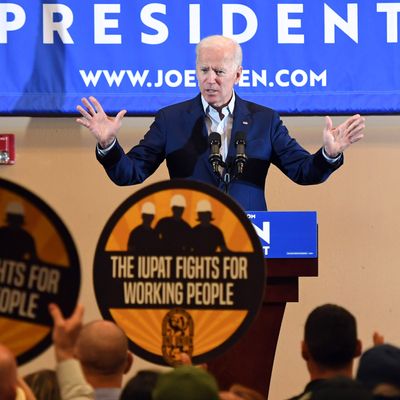
In his quest to become the Democratic Party’s nominee for president, former Vice-President Joe Biden is betting on labor. The candidate held his first official campaign event at a Teamsters hall, and quickly racked up an endorsement from the International Association of Firefighters. But Biden’s tenure as the only Democratic candidate to boast a union endorsement has come to an end — an early sign, perhaps, that his bid to win union votes might be more troubled than he’d imagined.
On Monday morning, members of the United Electrical, Radio and Machine Workers of America voted to endorse Senator Bernie Sanders at their annual convention. As quoted by the Sanders campaign in a press release, the resolution adopted by UE members credits the senator for “consistently” attending the union’s “strike lines and workplace actions.”
Throughout the primary race, Sanders has employed a strategy defined by direct engagement with labor. Last week, he became one of a handful of Democratic candidates to release a formal labor policy plan. (One of those candidates, Jay Inslee, subsequently dropped out of the race.) And he’s developed a particularly strong relationship with the UE, which represents around 35,000 workers in the private and public sectors. The UE is smaller than IAFF, which boasts over 300,000 members in the U.S. and Canada, but it’s still a major force. During a strike earlier this year nearly 2,000 UE members walked the picket line in Erie, Pennsylvania for nine days. It was the largest manufacturing strike to occur during the Trump administration, as Labor Notes reported in June, and Sanders joined UE members on the picket line.
The UE is independent, meaning that it doesn’t belong to the AFL-CIO, and is governed by a version of direct democracy, so it wasn’t bound by a specific process. Other unions, including the Service Employees International Union and the American Federation of Teachers, have already released detailed endorsement processes, so they won’t follow the UE’s lead anytime soon. But Monday’s endorsement does lend some support to the conclusion that Biden isn’t going to be able to count on union votes unless he begins to work for them. He’ll need more than the myth of his own electability to win them over — especially now, as his lead is beginning to shrink.
Though Biden continues to lead most primary polls, his approval rating among likely voters has steadily declined. On the same morning that UE announced its endorsement, a new Monmouth poll had Sanders and Biden in a three-way tie with Senator Elizabeth Warren of Massachusetts. By Monmouth’s accounting, Biden has lost support with almost every major demographic — including whites without college degrees, once thought to be a core base of support for the candidate. Other polls show that Biden’s lead has fluctuated since he entered the race, an indication that he is not such an inevitability after all. That has ramifications for the labor vote. Even cautious unions, which prefer to sink their bets on a sure thing and whose leaders may share Biden’s middle-of-the-road politics, may begin to reconsider their preferences.






























